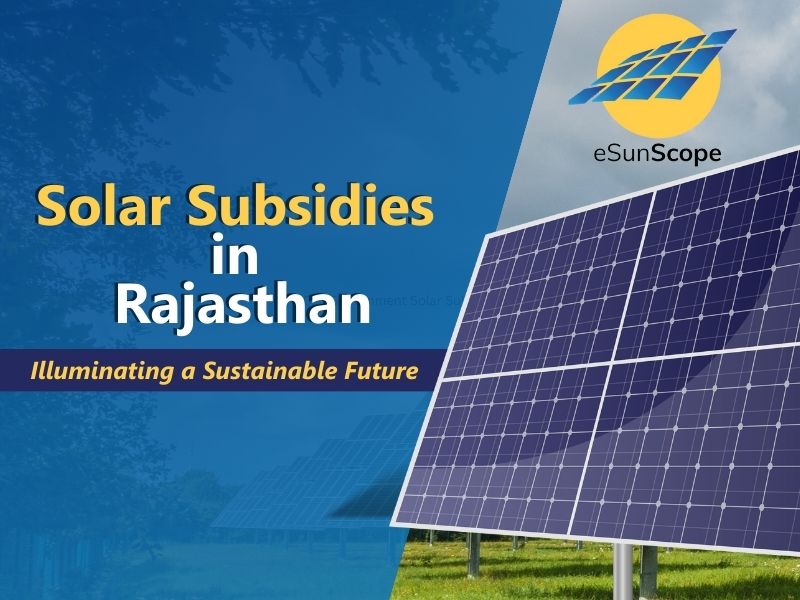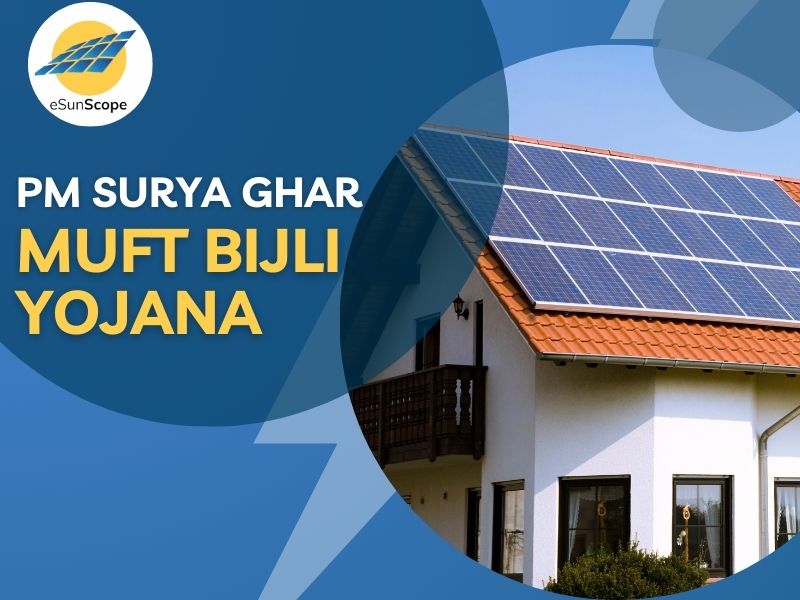Solar Subsidies in Rajasthan: Illuminating a Sustainable Future
In Rajasthan, the glimmering sun often beats down vast expanses of land, providing an
abundant resource waiting to be harnessed for sustainable energy. The state's foray into
solar energy has been reinforced by the government's steadfast commitment to incentivize
and promote solar power. In 2024, Rajasthan embarked on an ambitious journey by
introducing substantial platforms for utilizing the available subsidies from Ministry of New
and Renewable Energy, aiming to bolster the adoption of solar energy and pave the way
towards a cleaner, greener future.
Understanding the Significance of Solar Subsidies:
In an era where environmental concerns and sustainable living are at the forefront of global
conversations, the promotion and adoption of renewable energy sources, such as solar
power, have become increasingly crucial. The Ministry of New and Renewable Energy has
been implementing various incentives and subsidies, to encourage the uptake of solar
energy. These subsidies play a pivotal role in making solar power more accessible,
affordable, and attractive to individuals, communities, and businesses, thereby yielding a
multitude of benefits for people and the environment.
Solar subsidies have been pivotal in encouraging individuals, communities, and businesses
to embrace renewable energy sources. They act as catalysts, reducing the initial investment
burden, and making solar power more accessible and affordable for a wider demographic.
Rajasthan's solar energy mission in 2024 have marked a significant step towards advancing
the state's renewable energy agenda.
How Crucial is Solar Subsidy for the People?
Solar subsidies primarily aim to alleviate the upfront costs associated with installing solar
panels. These financial incentives come in various forms, including tax credits, rebates,
grants, and other financial mechanisms, making the initial investment in solar technology
more manageable for consumers. By reducing the cost barriers, subsidies enable a broader
demographic to embrace solar power, empowering homeowners, businesses, and
communities to transition towards cleaner and more sustainable energy options.
Advantages of Solar Subsidy:
One of the most significant advantages of solar subsidies is their positive impact on
individual finances. By lowering the initial installation costs, subsidies make solar energy
systems more financially viable for homeowners. This, in turn, decreases electricity bills over
the long term, providing considerable savings and potentially even turning solar adopters
into energy producers, feeding excess energy back into the grid and earning credits. This
financial relief proves especially beneficial for low and middle-income households, enabling
them to allocate saved funds towards other essential needs.
Furthermore, solar subsidies contribute to economic growth and job creation. The increased
demand for solar installations creates employment opportunities in various sectors, from
manufacturing and installation to maintenance and research. This not only drives local
economic development but also supports a transition towards a more sustainable, green
economy.
Environmental Impact
On a broader scale, the environmental impact of solar subsidies cannot be overstated. Solar
power significantly reduces greenhouse gas emissions, lessening reliance on fossil fuels and
mitigating climate change. By generating electricity from a renewable source, solar energy
minimizes air and water pollution, leading to cleaner and healthier communities. The
reduction in carbon emissions also contributes to a more stable climate, safeguarding
ecosystems and wildlife.
Security of Solar Energy
Moreover, the decentralization of energy production facilitated by solar subsidies enhances
energy security and resilience. By enabling homes and businesses to generate their
electricity, communities become less dependent on centralized power grids, reducing the
vulnerability to power outages caused by natural disasters or infrastructure issues. This
decentralized model contributes to a more robust and reliable energy infrastructure,
fostering greater resilience in times of crisis.
Its impact in the growth of Renewable Energy
It's important to note that solar subsidies also foster innovation and technological
advancement. The increased investment in solar energy research and development
encourages the improvement of solar technology, leading to more efficient and cost-
effective systems over time. This continuous innovation drives the growth of the renewable
energy sector, making solar power even more accessible and competitive in the long run.
However, despite these benefits, solar subsidies can face challenges. Critics often argue that
subsidizing solar power may strain government budgets or unfairly burden non-participating
taxpayers. Additionally, the phasing out of subsidies may lead to uncertainty in the solar
market. It's crucial for policymakers to carefully design and implement subsidy programs to
balance these concerns and ensure their effectiveness and sustainability.
Solar subsidies play a pivotal role in promoting the adoption of solar energy, offering a wide
array of benefits to individuals, communities, and the environment. By making solar power
more financially accessible, these incentives empower people to embrace clean energy,
driving economic growth, fostering job creation, and mitigating environmental impacts. As
technology advances and costs decrease, the continued support and evolution of solar
subsidies will be instrumental in shaping a sustainable and greener future for generations to
come.
Government Initiatives and Incentives:
The Rajasthan government, recognizing the potential of solar power, has introduced a
comprehensive set of incentives. These incentives include financial support, tax benefits,
and policies aimed at simplifying procedures for installing solar panels, thus encouraging
more citizens to opt for solar energy. These initiatives are designed to attract investments,
create job opportunities, and reduce the state's carbon footprint.
Financial Benefits and Subsidies:
The financial benefits of the solar subsidy scheme are multifaceted. The government
provides subsidies on solar panel installations, reducing the upfront cost for residential,
commercial, and industrial setups. Additionally, the scheme may encompass cash incentives,
low-interest loans, and grants for various solar projects, enabling individuals and
organizations to transition towards clean energy without significant financial strain.
Suitable Rooftop Solar Plant Capacity for households
|
Average Monthly
Electricity
Consumption (units)
|
Suitable Rooftop
Solar Plant
Capacity
|
Subsidy Support |
|
0-150 |
1 – 2 kW |
Rs 30,000 to Rs 60,000/- |
|
150-300 |
2 – 3 kW |
Rs 60,000 to Rs 78,000/- |
|
>300 |
Above 3 kW |
Rs 78,000/- |
Impact on Rural and Urban Areas:
The solar subsidy scheme in Rajasthan is not confined to urban areas but extends its reach
to rural sectors as well. This inclusivity ensures that even remote villages have the
opportunity to harness solar power. This implementation holds the promise of electrifying
remote areas, reducing dependence on traditional power sources, and fostering sustainable
development.
Technological Advancements and Innovation:
The incentivized environment has spurred technological innovation in the solar energy
sector. With increased investments and demand, there's a significant focus on R&D, leading
to the development of more efficient, affordable, and durable solar technologies. This
ongoing innovation is pivotal in enhancing the effectiveness of solar energy systems, making
them more accessible and productive.
Economic Impact:
The shift towards solar energy not only aids in reducing greenhouse gas emissions but also
contributes to the economic growth of Rajasthan. The decreased reliance on conventional
sources of energy, paired with reduced energy bills for consumers, amplifies the economic
benefits while simultaneously reducing the state's carbon footprint.
Challenges and Solutions:
Despite the remarkable progress, challenges persist. Issues like intermittent power
generation and storage remain. However, ongoing research and development aim to
address these challenges. Additionally, streamlining administrative processes, enhancing
infrastructure, and providing continuous support and awareness campaigns can further
augment the effectiveness of the subsidy program.
Public Awareness and Participation:
Public awareness and participation are integral to the success of any government initiative.
Encouraging citizens, conducting workshops, and providing informational resources about
the benefits of solar energy are crucial. As more individuals and businesses become aware
of the advantages, the rate of adoption is likely to increase.
Conclusion:
Rajasthan's mission and government solar subsidy in 2024 stands as a beacon of progress
towards a sustainable future. Its comprehensive approach to offering financial assistance,
promoting technological advancements, and ensuring inclusivity for both rural and urban
areas is a model for other states and nations to emulate. By leveraging solar energy,
Rajasthan is not only illuminating homes but also shining a light on a greener, cleaner
tomorrow. In conclusion, the solar subsidy program in Rajasthan for 2024 is not just a
government policy but a visionary stride towards sustainability, illustrating the state's
commitment to a brighter and more eco-friendly future.


.jpeg)























